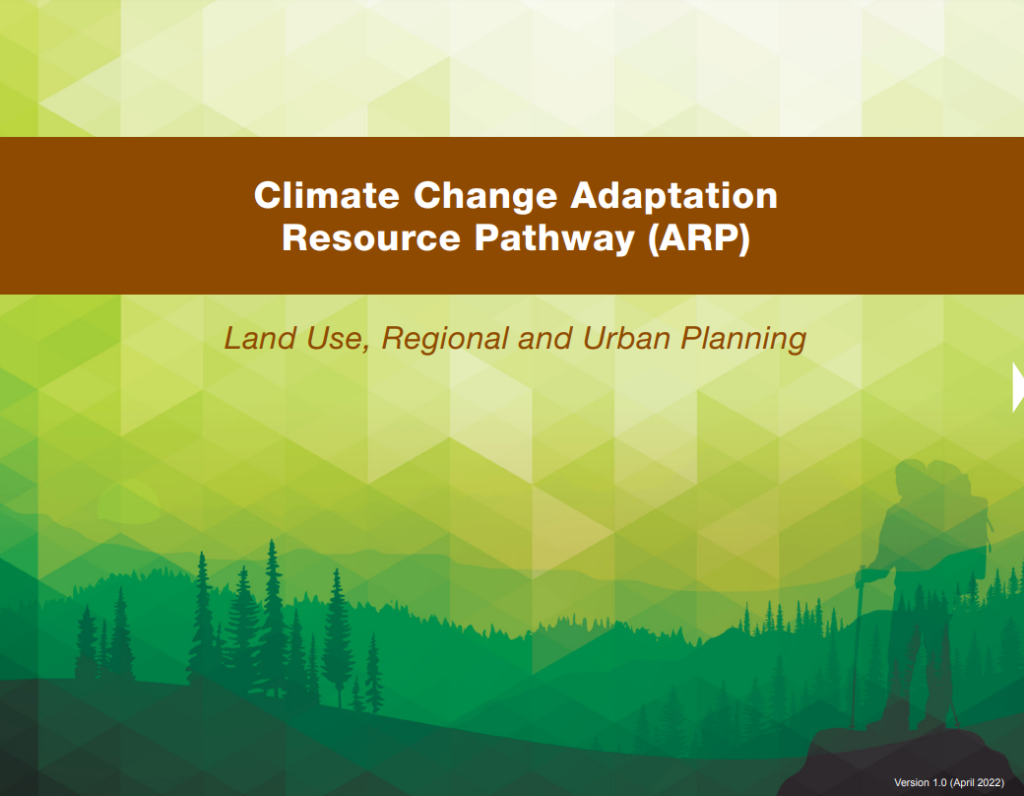Climate Change Impacts and Adaptation Training for Ontario Planners
In partnership with the Ontario Professional Planners Insitute and Dillon Consulting, the Climate Risk Institute has developed a customized training program for Ontario planners. The program explores how you, as Planners, can ensure communities are prepared for and resilient to the risks created by a rapidly changing climate. The online training brings together current knowledge informed by the deep experience of practitioners in the field and supported by an advisory committee of academic, municipal, private sector, and Indigenous members.
What will you learn?
- How to increase capacity and incorporate climate change adaptation into practice
- Gain a better understanding of the fundamentals of climate change science, data, risk assessment, and adaptation planning
- How to identify climate change adaptation policy applicable to planning
- Knowledge of tools and strategies available to implement climate change adaptation actions
- How to support communication and collaboration around climate change impacts and adaptation planning
- Insights into the ways of increasing community resilience using planning tools, asset management strategies, and nature-based solutions and explore options that present co-benefits for both mitigation and adaptation
Registration:
Registration and payment are through our partner website at Royal Roads University. You’ll need to create a Royal Roads account if you don’t have one
For registration and upcoming dates, click HERE.
Course Fee:
$795 plus applicable taxes
Fees cover online course instruction and presentation materials in pdf format. Participants will be provided access to course materials one week prior to the beginning of the Course. This training is intended for individual instruction, not for groups under a single registration
Notification
Would you like to be notified about future training? Sign up for the training mailing list.
| Module | Session | Date and Time |
| 1 | Day 1: Climate Change Fundamentals Day 2: Assessing Climate Risk and Adaptation Planning | Stay tuned |
| 2 | Day 1: Government Perspective on Climate Adaptation Day 2: The Regulatory Framework in Practice | Stay tuned |
| 3 | Day 1: Climate Change Communications and Collaboration Day 2: Tools of Climate Change Engagement | Stay tuned |
The program is primarily focused on adaptation action but also explores intersections between adaptation and mitigation. Climate change mitigation is about making sure the climate crisis doesn’t get worse. This could include making buildings more energy-efficient or providing people with more transportation options that don’t rely on combustion. Climate adaptation explores ways of addressing the existing or anticipated effects of climate change. For example, ensuring vulnerable community members are safe during an extreme heat event or protecting existing homes and buildings in areas of flood risk. The program explores how you, as Planners, can ensure communities are prepared for and resilient to the risks created by a rapidly changing climate.
Module 1 reviews the fundamentals of climate change science and data, impacts in Ontario, risk assessment and adaptation planning. Module 2 covers climate and planning policy, reviewing requirements and opportunities around climate change adaptation at the regional and municipal level. Lastly, Module 3 provides tools and strategies to support communication and collaboration around climate change impacts and adaptation planning.
Participants will work together on activities throughout, applying new concepts and checking their understanding throughout the training.
Meet the Trainers
Morgan Boyco, MCIP, RPP, Dillon Consulting
Morgan is a Registered Professional Planner and public
engagement specialist with over a decade of experience
working with communities and stakeholders across Canada to improve decision-making. As a planner and engagement practitioner at Dillon, Morgan has been a key team member on a number of complex and multi-faceted planning and dialogue processes, including collaborative climate change adaptation planning projects. He specializes in engagement
strategy and bringing innovative participatory tools and
methods, including digital civic engagement technologies, to complex community dialogues. In addition to his work at Dillon, Morgan is currently pursuing a Ph.D. in Planning at the University of Waterloo, researching how to improve public
participation in municipal decision-making. At Waterloo,
Morgan has been involved in research projects examining effective and innovative community engagement practices and was the recent instructor for Advanced Planning Tools: Public Participation, Negotiation and Mediation, a mandatory
undergraduate course in the School of Planning. Morgan has completed the International Association for Public
Participation (IAP2) Foundations in Effective Public
Participation course and has received additional training in social media for engagement, group facilitation methods, and large-scale public involvement techniques.
Justine Giancole, RPP MCIP, Dillon Consulting
Justine is a Partner, senior planner and project manager with Dillon’s community planning group, with over a decade of experience managing a wide range of planning projects. Justine specialises in planning policy and has guided her upper and single-tier municipal clients through many of their toughest growth management and policy decisions. She has a
strong understanding of the policy framework in Ontario and the tools available to municipalities to create sustainable, resilient communities for all.
Justine is a Registered Professional Planner, full member of the Canadian Institute of Planners and a LEED Accredited Professional. She is very active in the profession, having taken on many leadership roles, and recently completed her term serving as President of the Ontario Professional Planners Institute.
Zahra Jaffer, MES, Planner, Dillon Consulting
Zahra Jaffer is a planner and communications designer with broad experience in environmental sustainability and planning related projects, including the development of sustainability policies and planning frameworks that involve Zahra Jaffer is a planner and communications designer with broad experience in environmental sustainability and planning related projects, including the development of sustainability policies and planning frameworks that involve resilience, sustainable design, public realm enhancement and integration of natural environment considerations into development planning. She also specializes in public engagement and information design to translate complex concepts for a public audience. Zahra has worked with clients
across a range of sectors, including not-for-profit, government, industry, and private business and is proficient in visual communications software including Adobe Creative Suite, Sketch Up, and Geographical Information Systems (GIS). She is a certified ENVISION Sustainability Professional and sits on OPPI’s Southwest Ontario District Committee’s Kitchener- Waterloo Chapter.
Megan Gereghty, MCIP RPP, Climate Risk Institute
Megan Gereghty is a Climate Change Adaptation Planner with the Climate Risk Institute. As a Registered Professional Planner, Megan is passionate about climate change adaptation and resilient community development. Megan has experience and expertise in development, land use and policy planning projects. Her work focuses on the advancement of climate change adaptation training for planners. She holds a
Bachelor’s and a Master’s degree in Environmental Studies from the University of Waterloo as well as a Graduate Diploma in Climate Risk Management from the University of Waterloo. Megan lives in the Region of Waterloo, where she enjoys keeping up with local climate action initiatives and spending time outdoors.
Paul Cobb, B.Eng, Project Manager, Climate Risk Institute
Paul is a Project Manager with the Climate Risk Institute. An engineer by training, he has dedicated his career to finding and implementing climate change solutions. Paul has supported climate mitigation and adaptation work across Ontario and Canada for close to 20 years, including a recent role as a regional advisor for the Federation of Canadian Municipalities Partners for Climate Protection Program. Paul has led Climate Change Risk Assessments at the local, provincial and territorial levels. He lives and works and is raising his kids in beautiful Northern Ontario.
Anna Zaytseva, B.A. (Hons), M.Sc, Climate Risk Institute
Anna is an Advisory and Technical Services Liaison of the
Climate Risk Institute. She is passionate about sustainable development, climate change adaptation and risk assessment. Her experience includes working on place-based projects studying key drivers of change, modelling alternative future scenarios and researching impacts of climate change and weather extremes on the agricultural sector. Anna has 10 years of experience working with weather, climate and geospatial data in a variety of settings, including government and academia. She is proficient in geospatial and statistical modeling software and has in-depth knowledge of spatial analysis technologies. At the Climate Risk Institute Anna provides support on a number of projects and tools including
Climate Change Hazards Information Portal (CRI’s in-house climate data and projections tool), the Ontario Regional Adaptation Collaborative, and Ontario’s Provincial Climate Change Risk Assessment.
Alli Myles, B.A., MCC, Climate Risk Institute
As an Adaptation Extension Liaison with the Climate Risk
Institute, Alli works with a wide range of stakeholder groups to build climate resilience. She is passionate about creating compelling content for communicating climate science to mobilize knowledge, improve capacity and highlight the interconnected technical and cultural dimensions of climate change. She has previously worked in municipal government, leading staff, stakeholders and community members through
workshops to prepare for the local risks and impacts
associated with a changing climate. Alli has acquired
experience in vulnerability and risk assessments,
mainstreaming climate considerations into policy and
decision-making processes and community adaptation
planning and implementation. She holds a Bachelor’s degree in Environmental Studies from Wilfrid Laurier University and a Master’s degree in Climate Change from the University of Waterloo, providing her with an interdisciplinary background in climate risks, impacts and adaptation.
Looking for more planning-related climate change adaptation resources?
Check out the interactive PDF developed by CRI, in partnership with the Canadian Institute of Planners.
Supported by Natural Resources Canada’s
Building Regional Adaptation Capacity and Expertise (BRACE) Program

For more information, please contact the Manager of Training Services, Paul Cobb

